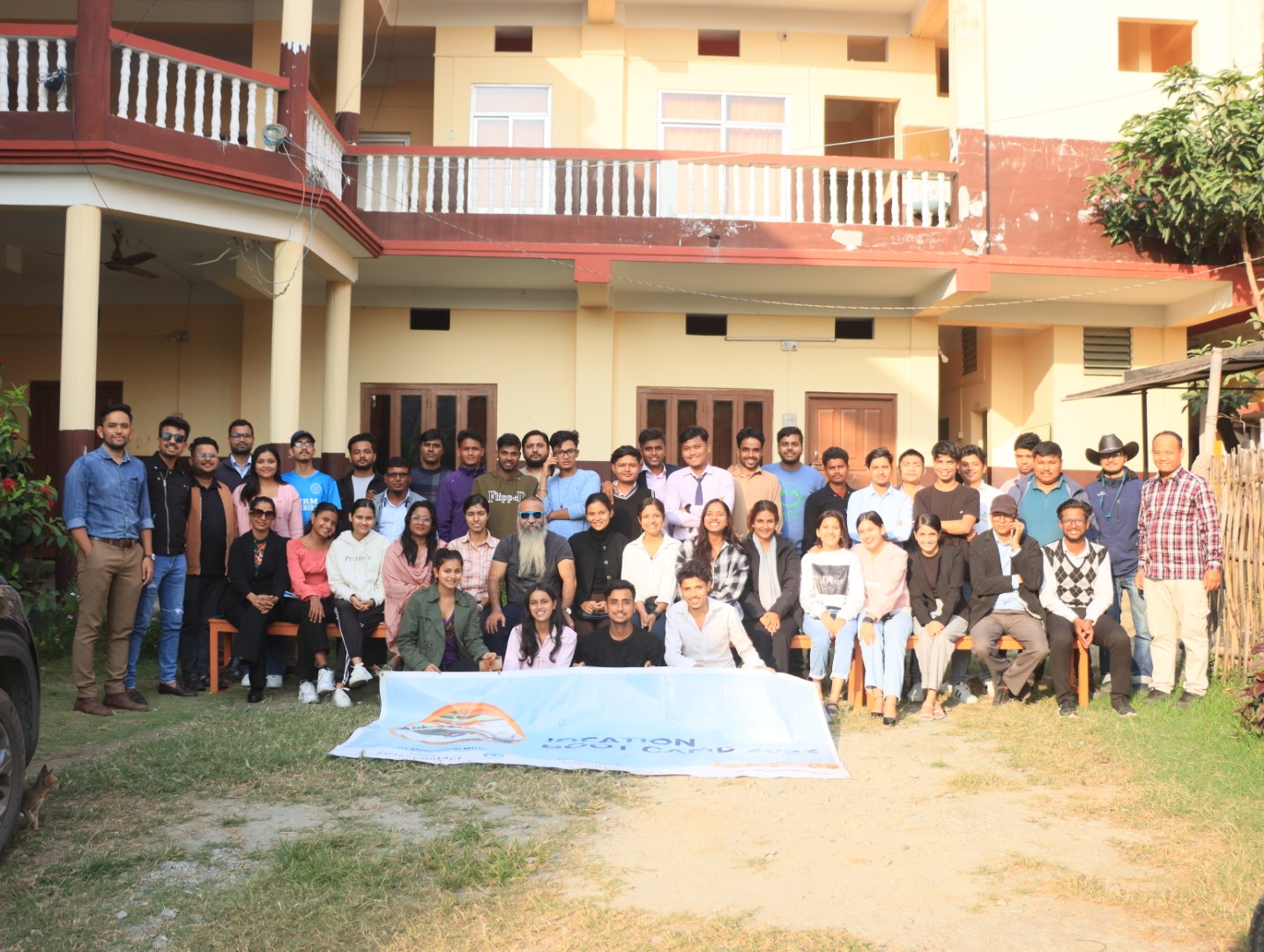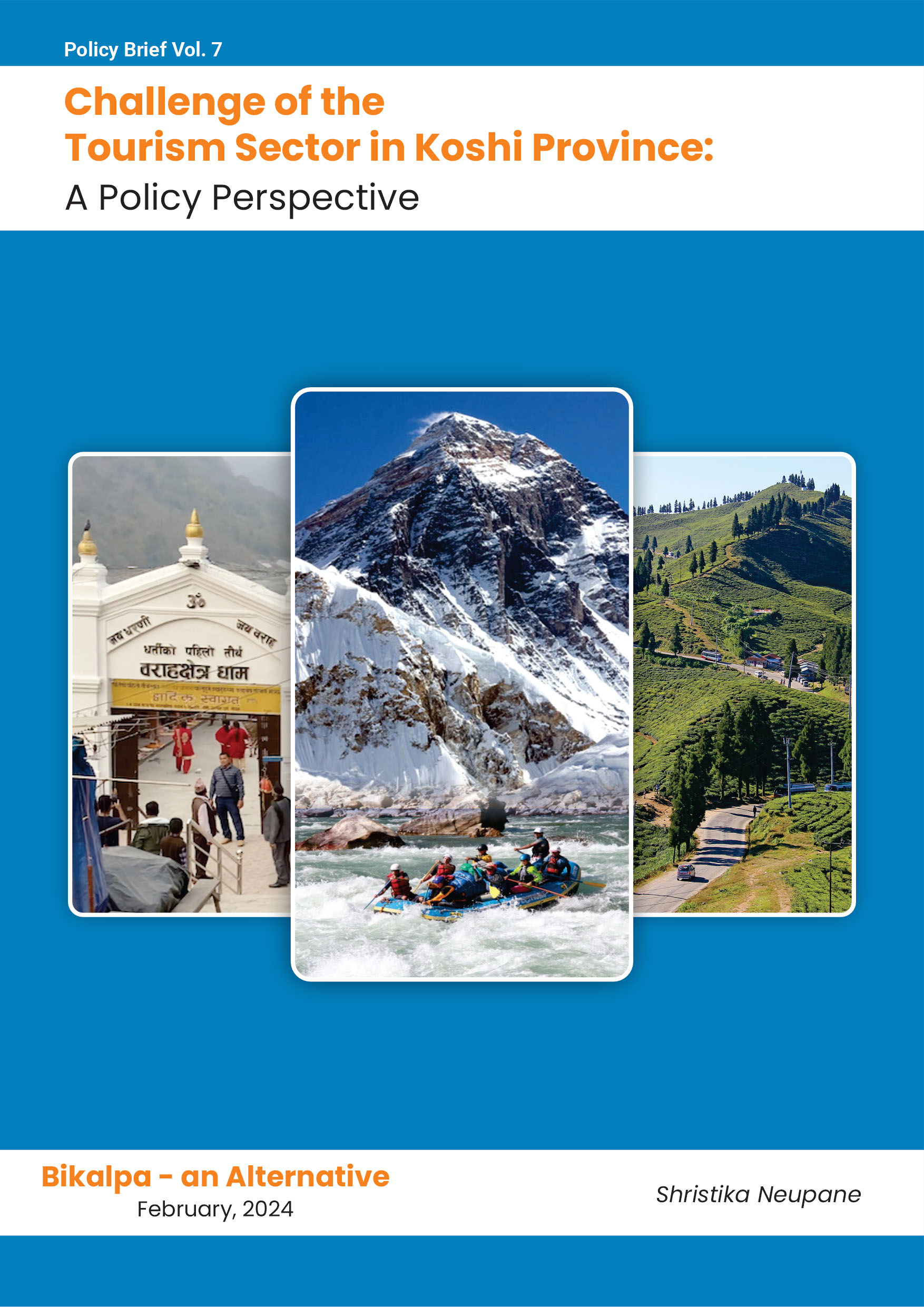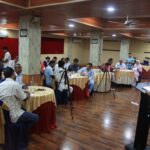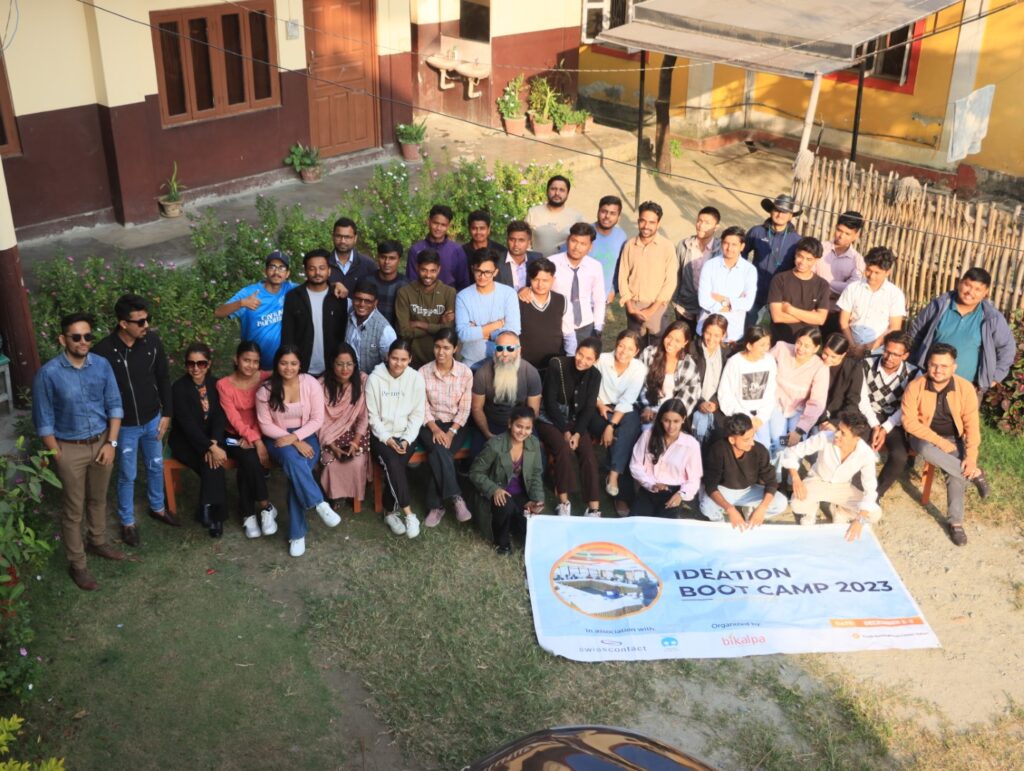
Background of the program
Bikalpa an Alternative, in association with Swisscontact, Stepup project, and Aasman Nepal Bikalpa an Alternative, organized the “Ideation Boot Camp 2023 ” Program from 2nd to 3rd December at Youth Development Center, Itahari. The program aimed to train aspiring young entrepreneurs, harness their ideas, and empower them to be entrepreneurs.
Objective of the Program
Identify potential young entrepreneurs from Koshi Province of Morang and Sunsari District.
Educate the boot camp participants on business development, harness their ideas, and empower them to be entrepreneurs.
Create a networking platform for like-minded aspiring young entrepreneurs where they can share their ideas and challenges regarding their business ventures.
The course involves various interactive learning methods, including guest lecture sessions, dynamic games, group work, and Panel discussions designed to allow participants to explore and share ideas about entrepreneurship. It also helps to equip the participant’s opinion with fundamental concepts of entrepreneurship and Leadership Management, start-up, and marketing to understand the root cause of business challenges and effectively work on their ideas. The training includes topics on What is Entrepreneurship? Why is it important? Lean Business Canvas, Panel discussion with entrepreneur, Entrepreneurship Management and Team Building, Registration and Promotion of Shramsansar and Idea Preparation, Idea Pitch Competition, etc.
During this idea boot camp in Biratnagar, 39 aspiring participants from diverse groups joined the workshop. Among the distinguished speakers were, Mr. Suraj Raj Bhagat (Founder & CEO of Bhagat Suppliers ), Mrs (Sunita Chharahang president, of the Women entrepreneur committee, FNCSI, Morang) Mrs. Dina Pradhan (Mrs. Dina Pradhan, Co-Founder of Baari Roastery and Director of Namaskar Hotel Management School Pvt. Ltd.), and Mr. Anil Parajuli (Startup and Innovation Support Expert) were the resource person and panelists in the event. Also, Mr. Basanta Adhikari (Executive Director of Bikalpa), Mr Dr Sandesh Dass Shrestha (Associate Professor of Purbanchal University) and Mr. Ganesh Dahal (Project Coordinator Step- Up Project Aasaman Nepal) were invited as a Local resource person for training. It was a pleasure hearing from all of them.
The two-day boot camp delved into the fundamentals of a creative approach by immersing the participants in discussions, group activities, and team exercises. It was a Flexible seating arrangement that stimulated two-way communication and creative movement. The platform was engaging and informative for the exchange of knowledge. During the program, round table model discussion further helps in teamwork and enhances a collaborative learning experience for participants. All the participants during the program were articulate and participative. The program is scheduled from 8 am to 6 pm.
Boot camp Activities details
The program started with an ice-breaking introduction round, ground rules setting, before the core sessions of the day. The sessions and learning of each day can be summarized below.
Day 1
Session I: Importance of entrepreneurship: Mr Basanta Adhikari

Basanta Adhikari facilitated the session on Entrepreneurship and its Importance. Participants were divided into five groups during the session with a presentation assignment. Through the work, the participants dealt with the five core questions on Entrepreneurship, i.e., What is entrepreneurship? Why is entrepreneurship important to society? Why should I be an entrepreneur? How are entrepreneurs perceived in our community?, What are the conditions that promote entrepreneurship? What are the challenges of entrepreneurship? After 30 minutes of group work, each group presented their opinion in a 5-minute pitch. The best group was selected through a popular vote and rewarded accordingly.
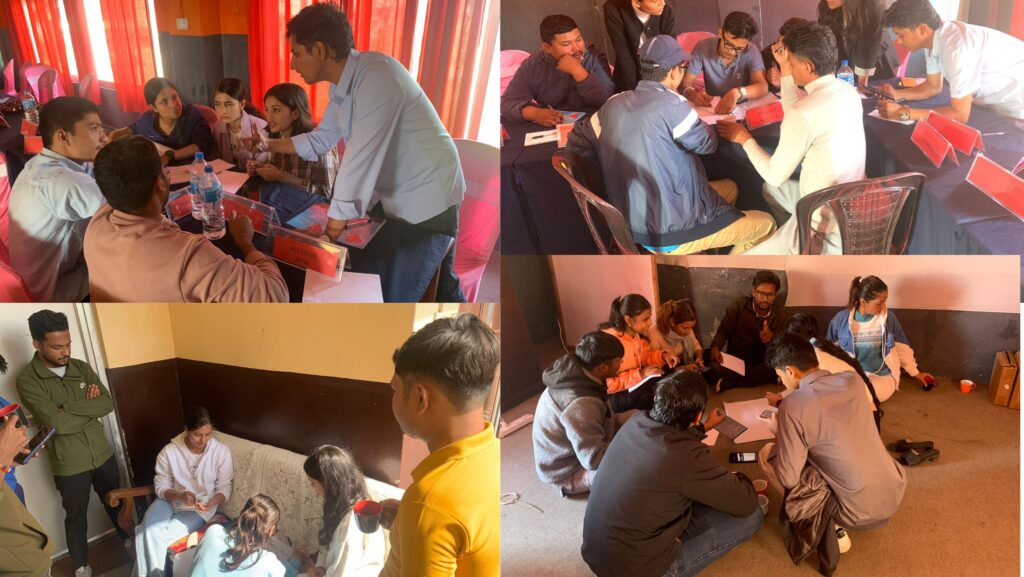
Basanta Adhikari provided brief feedback on the presentations and clarified the definition of an entrepreneur, their perception of Nepali society, and how they evolved. During his presentation, he illustrated different examples of why some countries were rich and others were forced to remain poor. He also stressed that prosperity and poverty could be achieved through good and bad policies. Those sessions also covered sound economic policies and how they facilitated entrepreneurial activities and created an environment that could uplift the common masses’ financial status. The session on Beauty of Market educated students on how markets help to solve problems and ease the lives of ordinary people through its services and products. Besides this, the session highlighted how markets fulfilled the need gap between demand and supply, offered choices, and helped prosper society by cooperating with self-interested individuals.
Lean Business Canvas Mr Anil Parajuli : Startup and Innovation Support Expert
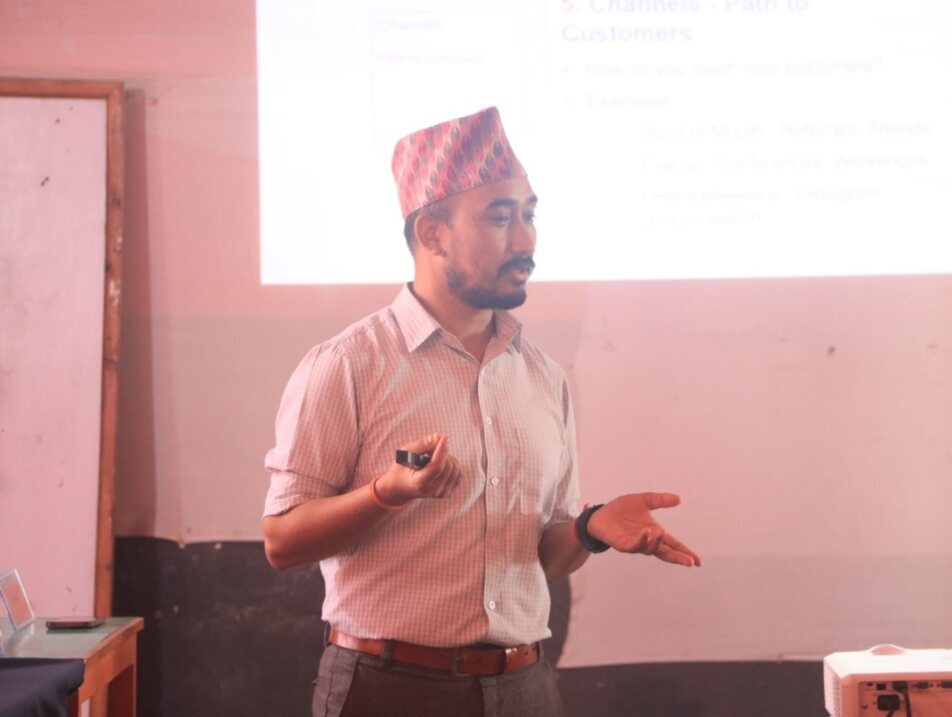
The session began with Resource Person Mr Anil Parajuli providing a clear overview of the Lean Business Canvas and its distinctions from the Business Model Canvas. He said that The Lean Business Canvas is a simplified and visual tool used by entrepreneurs and startups to help them plan, refine, and communicate their business models. It’s a straightforward problem-solving strategy that allows the entrepreneur to progress in small steps. While Business Model Generation Canvas, on the other hand, is solely focused on new and existing businesses, with a strong emphasis on client categories, channels, and customer connections. It promotes open communication, innovation, debate, and constructive analysis.
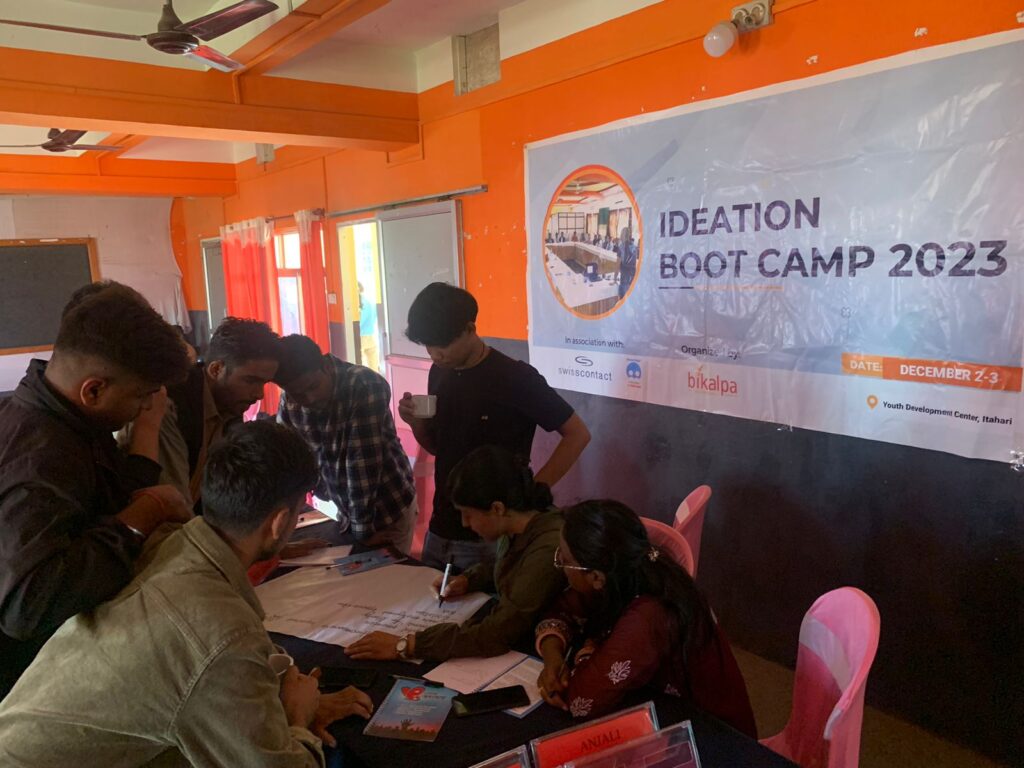
The primary focus of the Lean Business Canvas Model is to streamline the business development process. It encourages entrepreneurs to take small, calculated steps while fostering open communication, innovation, debate, and constructive analysis. This approach is instrumental in reducing waste, minimizing risks, and increasing the likelihood of building a successful and sustainable business. During the session, Mr. Parajuli highlighted the nine most essential aspects of a business model of the Lean Business Canvas, where he divided it into two segments, Product and Market, which include:
Problem & Existing Alternatives:
Describe the top 3 problems you see for customers that need to be solved. List existing alternatives. What are people/companies already doing to solve the problem?
Customer Segments: Defining the specific customer segments, including their demographics, needs, and behaviors.
Unique Value Proposition: Single, clear, compelling message that states why you are different and worth paying attention.
Solution: Outlining the product or service that addresses the identified problem. For each of your 3 problems, define a solution,Top 3 features addressing your problems
Channels: Planning the channels through which the business will reach and acquire customers, such as online advertising or partnerships.
Cost Structure: Analyzing the cost components of the business, encompassing fixed and variable costs.
Revenue Streams: Identifying how the business will generate revenue, such as sales, subscriptions, or advertising.
Key Metrics: Determining the key performance indicators (KPIs) that will be tracked to measure business success and progress. The numbers that tell you how you are performing! Find the key number that tells you how your business is doing in real-time
Unfair Advantage: Recognizing any unique advantages or assets that make it challenging for competitors to replicate.
He introduced the participant’s example of his Startup company business model during his presentation to explain the Lean canvas model. Also, to reinforce learning and application, each participant was assigned the task of applying the Lean Business Canvas Model to their own business ideas or projects. This hands-on exercise allowed participants to gain valuable insights into understanding and refining their business models. He also shared the pitch idea to the participants, telling them to focus on their idea, identifying a problem, solution, and impact. Overall, the interactive nature of the session, combined with practical examples, made it a highly informative and engaging event. :
Entrepreneurial Leadership & Team Building
Dr Sandesh Dass Shrestha, Associate Professor of Purbanchal University
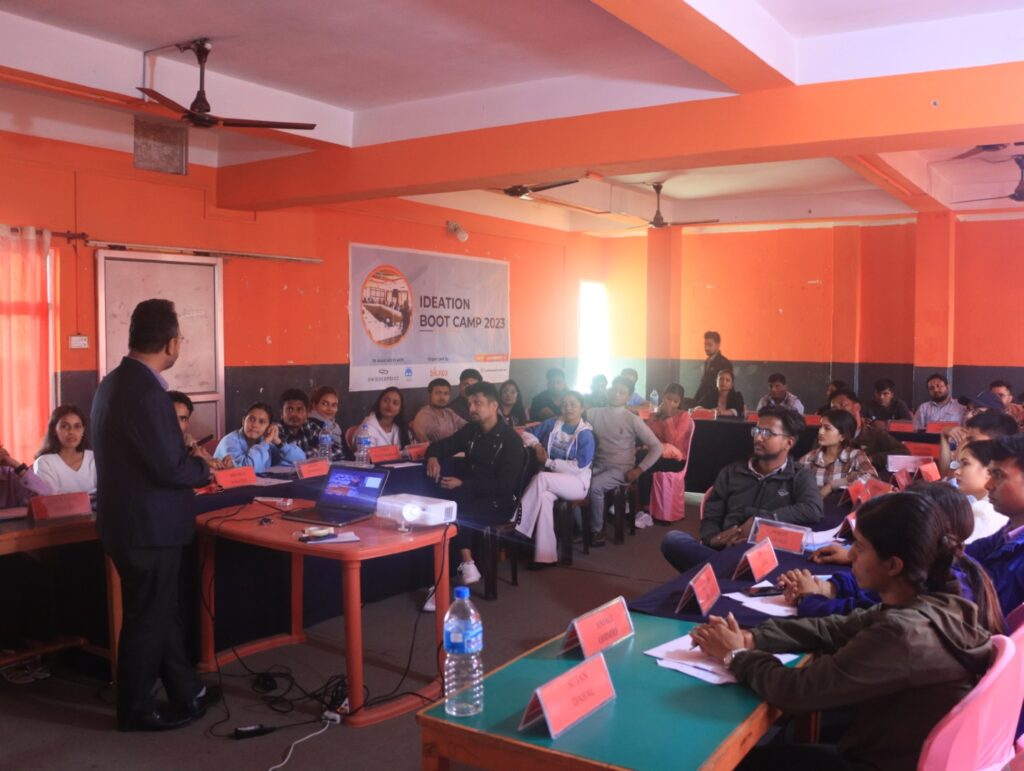
The Resource Person started the session with asking their view of participants regarding the leadership quality of entrepreneur need to have. After that Dr. Shrestha provided a comprehensive overview of entrepreneurial leadership, highlighting its significance and its key associated traits. He elucidated that entrepreneurial leadership can be defined as the capability to envision, initiate, and navigate the journey of a startup or small business. It involves effectively inspiring, motivating, and guiding a team toward common goals. Entrepreneurial leaders are often found in startups, small businesses, and social enterprises, but they can also emerge in any context where there is a need for change and innovation. He emphasized that this leadership style transcends the boundaries of startup founders and extends to anyone taking on a leadership role within an entrepreneurial context.

He also shared that entrepreneurial leadership is more than just a leadership style. It is a mindset. Entrepreneurial leaders are change-makers who act proactively, have a vision, and take bold steps to turn it into reality. An entrepreneur leader is equal to leadership and management; they have an eagle eye and mouse vision. He explained that having an eagle eye means having a clear and compelling vision of the future while having a mouse vision means focusing on the details and executing the tasks efficiently. He added that we need both a leader and a manager because the leader makes the strategy, and the manager manages and implements it. An entrepreneurial leader requires an openness to learning, inviting opportunity, and motivating and mobilizing others to do the same. It’s like any other competency you’re trying to build – you have to start only with the desire to change but also with a commitment to practice. He also said that if you want to be an entrepreneur, you need to focus on these four things: the strategy, The result, The team ( all your relationships), and Yourself.
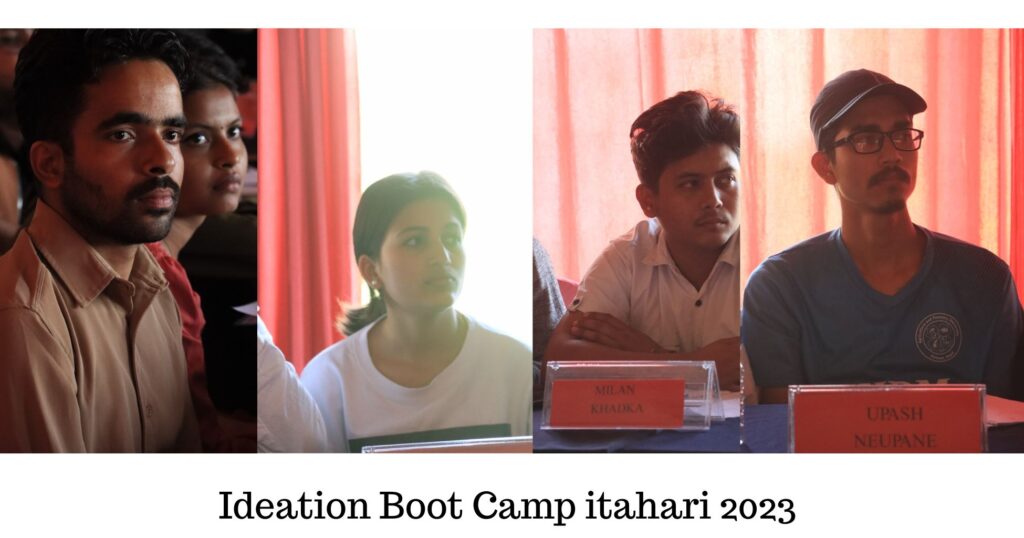
During the session, Dr. Shrestha also explored the pivotal role of team building in entrepreneurship. He highlighted that team building enhances productivity, boosts employee motivation, encourages collaboration, and fosters trust and respect among team members. Team building is an essential aspect of entrepreneurship, as it can enhance the startup team’s performance, innovation, and satisfaction. He stressed that Team building is creating a team cohesively working together towards a common goal. He said that teams are the engine that drives entrepreneurial success. So, to build the brand value of your product, you need a team. You need to hire professional people, no matter how talented the leader; without the right team, an entrepreneurial effort is bound to fail. Throughout the session, participants engaged actively by asking questions and participating in discussions. Dr. Shrestha provided practical examples and case studies to illustrate the principles of entrepreneurial leadership and team building.
Day 2
The day two session was started with the reflection of day one session and participant’s feedback regarding the all sessions.
Entrepreneurship Panel Discussion Session
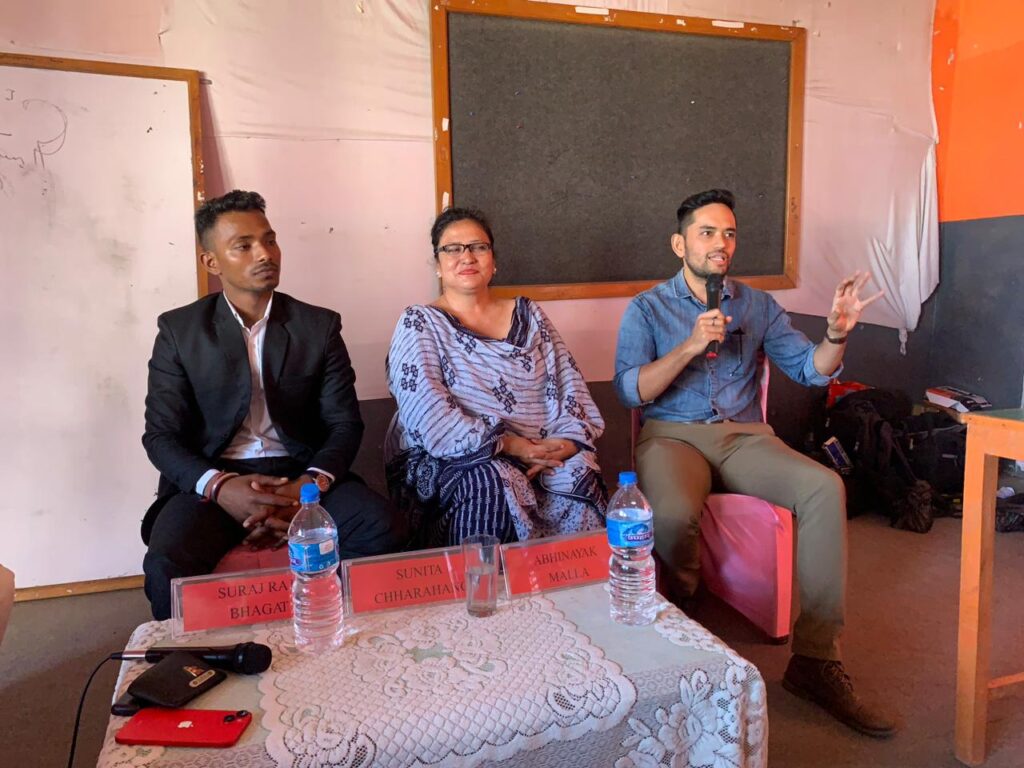
Three entrepreneurs from Biratnagar were invited as panelists for the panel discussion session on entrepreneurship. The 2-hour session was divided into a closed session, where the panelist were provided 12 minutes each for sharing about their entrepreneurial journey, and explain about their business, constraints, challenges and opportunities encountered during their journey as an entrepreneur. The second session was an open session where the participants were allowed to ask questions to the panelists. The panelist included Mr Suraj Raj Bhagat, (Founder & CEO of Bhagat Suppliers and Kabadi.com). Another panelist was Ms. Sunita Chharahang, President of Federation of Nepalese Cottage and Small Industries, Morang Chapter and proprietor of Maya Ko Chino, a handicraft manufacturing company and Mr. Abhinayak Malla (Founder Wakecup Coffee, Biratnagar)
Suraj Raj Bhagat
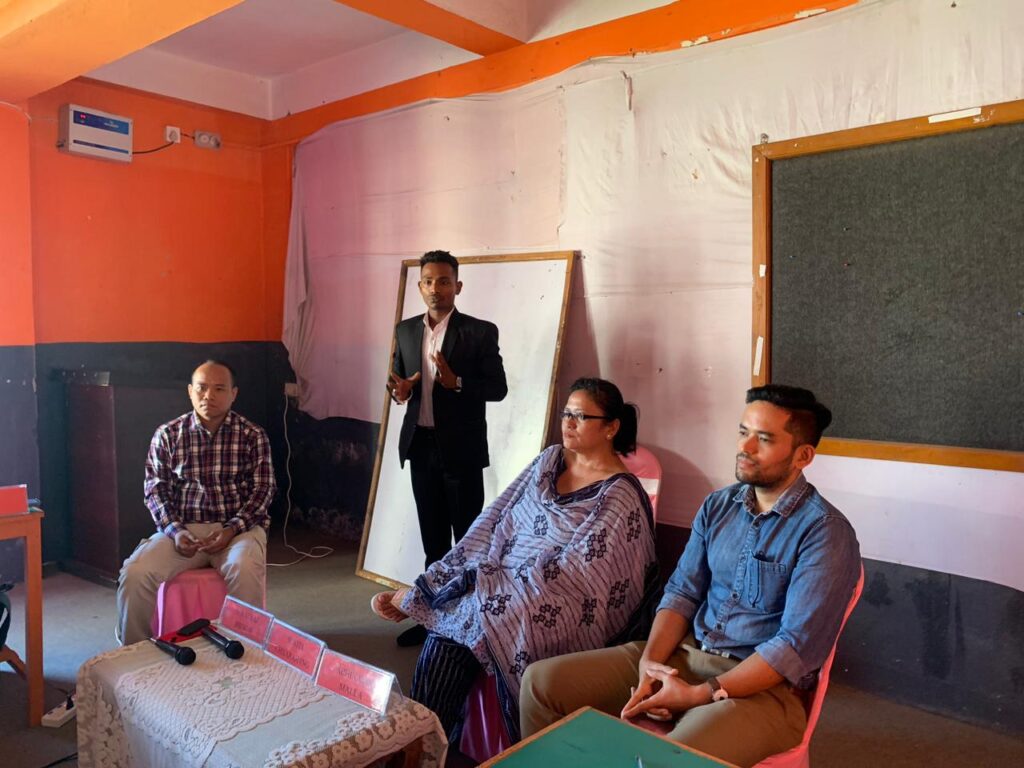
During a panel discussion, Suraj Bhagat, the Co-founder and CEO of Bhagat Suppliers, shared his compelling entrepreneurial journey. He highlighted his obstacles before venturing into business, emphasizing his challenging early life and work experiences in Nepal and India. Bhagat shared the financial struggles of his childhood, highlighting how a privileged education opened doors to promising opportunities. Reflecting on his initial entrepreneurial hardships, Bhagat disclosed his humbling year. He emphasized that his drive stemmed from a burning ambition to create and make a meaningful contribution. Additionally, he underscored the significance of setting goals, emphasizing how they offer a guiding light, a clear vision, and defined milestones. In essence, Bhagat’s discussion encapsulated his journey’s foundation in early adversities, highlighting the vital role of motivation derived from purpose and the importance of setting clear goals for personal and professional growth.
Sunita Chharahang
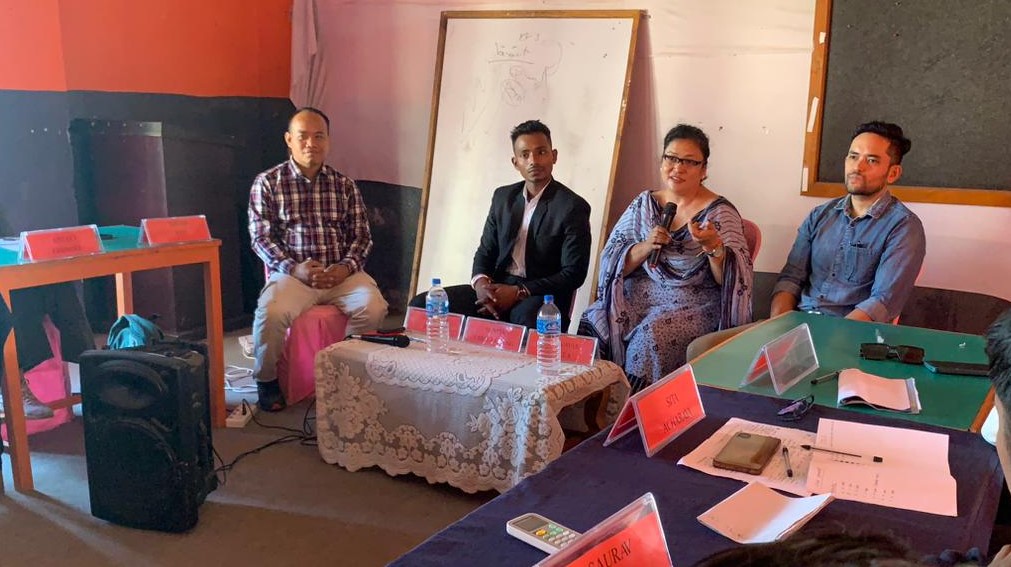
Ms. Sunita Chharahang, shared an inspiring journey of transformation from lockdown adversity to entrepreneurial success. Her engaging narrative sheds light on the transformative power of resilience and creativity. She commenced her insightful presentation by recounting how the lockdown period unexpectedly became a turning point in her life, propelling her toward entrepreneurship. She revealed that her enduring passion for arts and crafts was the foundation for her entrepreneurial venture. She emphasized her long-standing practice of restoring and repurposing waste materials, a habit that eventually led to the creation of unique handicraft products. She also shared female entrepreneurs’ challenges, citing familial obligations and the lack of economic freedom as significant barriers. She also talked about women entrepreneurs’ dilemma, highlighting the dual responsibility of managing households while running a business. Ms. chharahang underscored the inherent challenge of balancing these roles, reflecting on how societal norms often inhibit women from fully realizing their entrepreneurial potential.
Abhinayak Malla
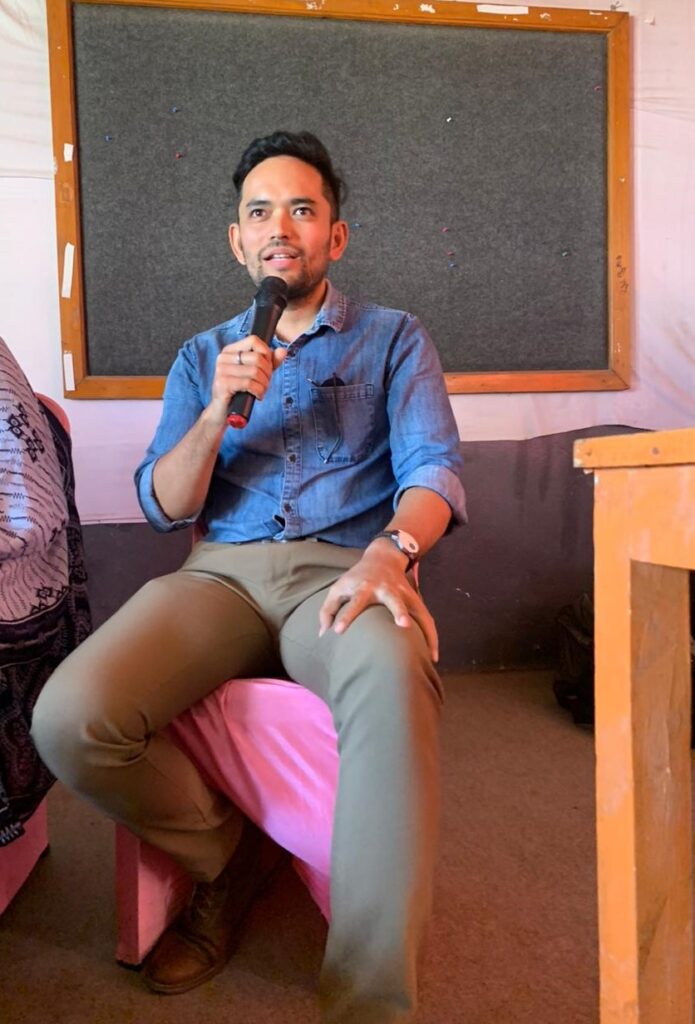
Mr Abhinayak Malla, managing director of Malla Group of Companies and proprietor of Wakecup Coffee chain and farm. He shared about the challenges faced while pursuing innovative business model and the procedural hassles faced by such businesses.
The three panelists also answered questions related to following issues: – procedural hassles faced by small businesses in registration and taxation. – Implications of export and import policies and existing conditions on small businesses. – Credit crunch in the financial market and how to start a business during such volatile financial conditions – The effect of entrepreneurial mindset on youths. – Problems related to access to finance and starting a business. – current business climate for entrepreneurs in Nepal
Video Discussion Session
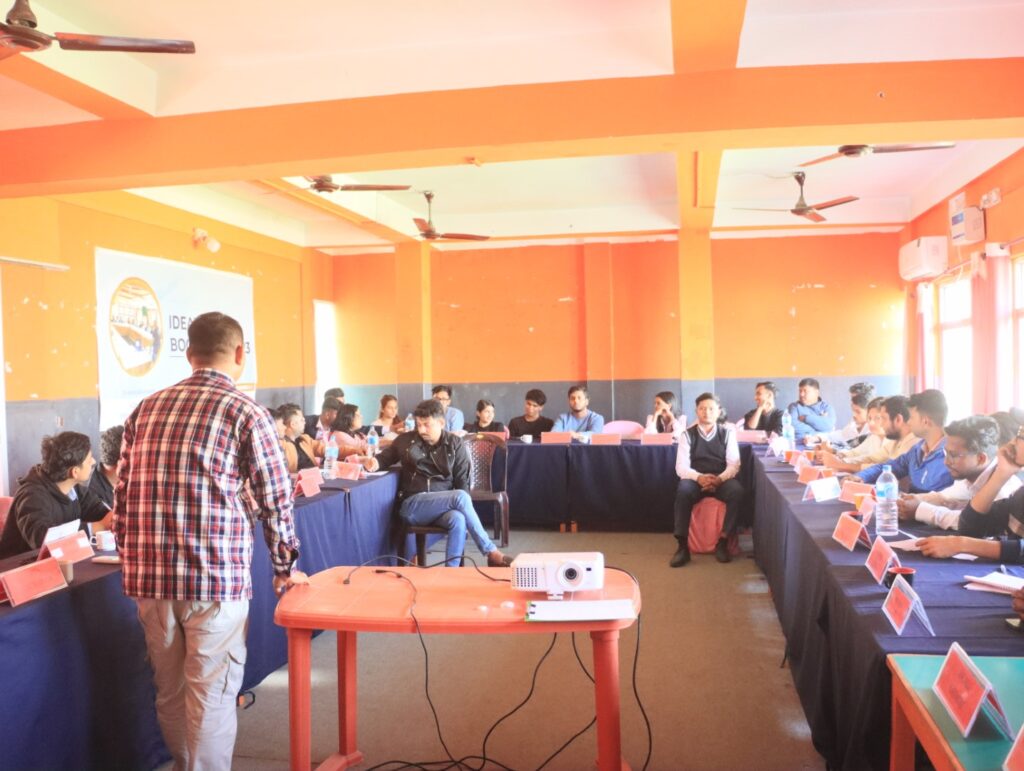
The third session, also led by Suman, explored policy issues through two powerful short films: “i-TSHIRT: The Story of a T-shirt,” reflecting economic freedom and the invisible hand, and “Let Me Earn My Living (Sadak Chheu ko Byatha),” tackling the challenges of conducting economic activities in Nepal. “i-TSHIRT” unveils the story of a T-shirt, highlighting both the obstacles entrepreneurs face and the value they create for ordinary people and society . The second film, “Let Me Earn My Living,” vividly portrays the bureaucratic hurdles and difficult environment faced by those engaging in economic activities in Nepal. Following each film, Mr. Rai facilitated discussions by gathering participant feedback and clarifying any issues raised by the movies.
Ganesh Dahal : Project Coordinator / Step- Up Project/ Aasaman Nepal
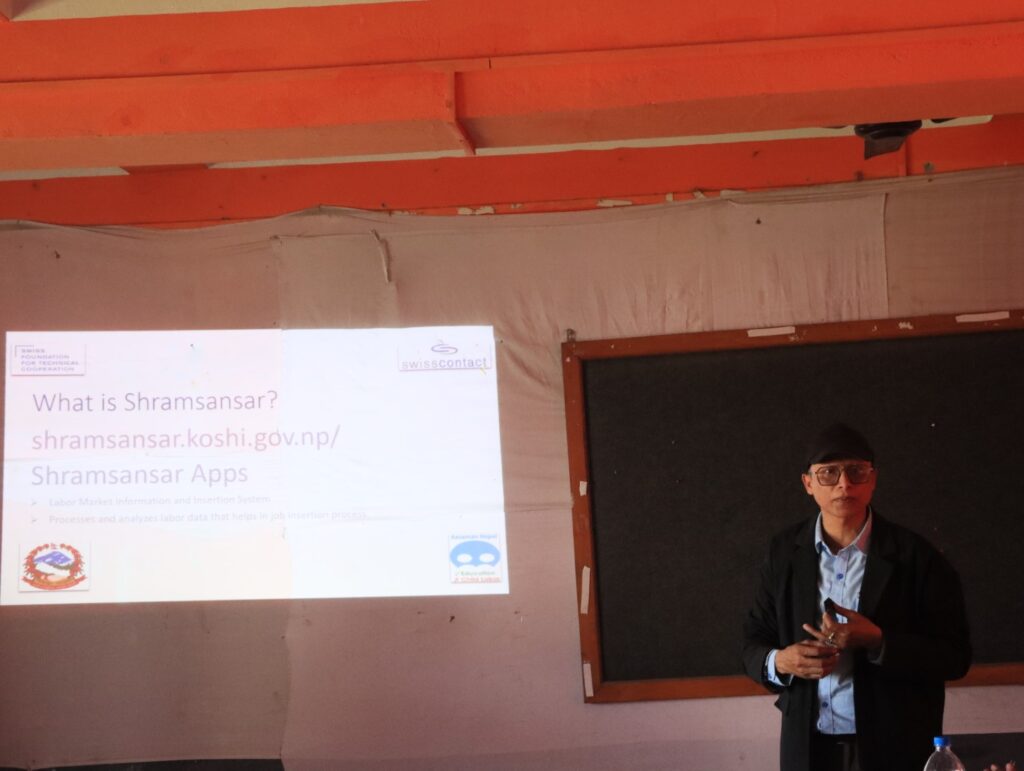
The session commenced by focusing on the presentation of Shramsansar Apps, which can be accessed at shramsansar.koshi.gov.np/. Mr. Ganesh Dahal, the presenter, introduced the audience to the aim and purpose behind the development of Shramsansar Apps. He emphasized that the platform is designed as an information system to provide quick and relevant information. According to Mr. Dahal, Shramsansar Apps are a valuable resource for job seekers and employment service providers, offering them access to pertinent information about the labor market. This user-friendly system facilitates the efficient exchange of information related to employment opportunities, skills development, and labor market trends. He also practically showed the participants the registration process of their data information regarding the Shramsansar Apps. Mr. Ganesh Dahal further elaborated on the objectives of the Stepup Project, shedding light on the project’s mission and strategies for achieving its goals. He shared how they are working with three Local government municipalities to support entrepreneurship development through various means of support. The session concluded with an engaging Q&A session, allowing participants to seek clarification and further information.
Idea Preparation, Idea Pitch Competition
In this session, each Participant was assigned to Pitch their business idea. The participants were provided with a basic guideline for their assignment, which included an introduction, clarity of idea, solution, and call for action. During the session, each Participant presented their business idea to all three judges, who were sector enthusiasts with relevant expertise. Each Participant was provided with two minutes of time duration to present their business idea.
The judges for the Participant’s evaluation were.
Mr. Abhinayak Malla .
Mr. Sarwagya Raj Pandey : .
Mr. Chandra Bhushan
After the idea pitch session, one of the judges, Mr. Sandesh Dass Shrestha, provided participants with insightful comments and feedback after apprehending their presentations. Also, the top eight winners were selected after the pitch session, for whom Bikalpa will organize further engagement training in the coming days. Overall, this session was a valuable learning experience for participants and organizers. Participants gained practical skills in presenting their business ideas and presentation and communication skills. The judges’ feedback provided participants with constructive criticism and insights into improving their analytical and presentation skills in the future.
Concluding Remarks
Despite a few challenges, the training was well organized and helped enrich participants’ knowledge and understanding of entrepreneurship, Business Startup, and idea values. Questions were taken from a participant during the session’s hour, and participants were open enough to share their queries regarding the topic. All the participants ended with a note that they had good experience and connections with the Network. Various interactive learning methods, such as dynamic games, panel discussions and group work, were included during the training hour. These contents helped participants with opportunities to explore and share ideas. Altogether, the event was summed up by distributing the certificate at the end of the program on 3 December 2023.

